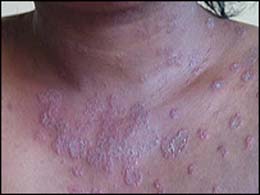 |
| Tanzanian women discover that 'beauty' comes at a cost |
As Tanzania bans some skin-lightening creams, the BBC News website looks at the health damage wrought by such cosmetics in a country where black is often seen as "not beautiful enough".
Latifa Myinyikwale's face, back and legs are pitted with tiny scars, her skin is blotchy and uneven, the result of using skin-whitening creams over a two-year period.
Latifa is a hairdresser and all around the hair salon where she works are images of young black African women with light, almost white, skin.
These are the images of beauty that are influencing young women not just in Tanzania but across Africa, images which equate beauty with having a whiter complexion.
Latifa bought into that image.
"You hear that if you want to look beautiful, then you have to look like a white person and to look like a white person you have to use these creams. Of course it is natural that women want to be beautiful," she says.
But using the creams can have devastating health consequences and now the authorities in Tanzania have started a process of removing 83 banned creams from shops across the country.
Peeling skin
The range of lotions available is huge. They have colourful names which associate royalty, romance and even religion with a white or pale skin, but many contain harmful chemicals like mercury and hydroquinone.
Some are heavily laced with steroids and cortisone. Latifa Myinyikwale has discovered that beauty comes at a cost.
"In the beginning, I did not notice the bad effects of the chemicals," she says.
"But after using them for two years, I started developing severe rashes all over my body.
"My skin was rough like a snake's and then it started peeling off. It was very painful, so I had to go to the hospital."
Latifa is one of the lucky ones. The damage was only skin deep.
Many women are left with more serious and potentially fatal complaints like skin and liver cancer. Some find it difficult to conceive.
"The bad affects of using the creams are not immediately obvious," says Dr Yassim Mgonda, a dermatologist at Dar es Salaam's Muhimbili Hospital.
Drive to educate
"The harmful chemicals build up in the body over time and sometimes when patients come for treatment it is too late to help them."
Selling whitening creams is a lucrative business in Tanzania worth millions of US dollars a year.
Shelves in pharmacies are stacked high with lotions, creams and soaps all promising to make women whiter and supposedly more beautiful.
They cost anything from $4 to $10 each, a huge amount of money in a country where the average wage is less than a dollar a day.
Many products on the banned list are imported from cosmetic companies in France, Ireland and the United Kingdom which are household names.
Worse still, some genuine imported brands not containing harmful chemicals, and which are not subject to the ban, are being manufactured illegally in Tanzania containing the banned substances.
The job of clearing up this hitherto unregulated industry has been given to the Tanzania Food and Drugs Authority (TFDA) which last year successfully pushed for legislation to prosecute businesses which sell the banned creams.
"It's a daunting task," says Margaret Demondo, the director general of the TFDA, "but now we have the legal backing to go out and stop rogue traders selling these creams."
This is just the first step of the TFDA's campaign. Ultimately it hopes to re-educate women that black, whatever its shade, is beautiful.
"Whether an African lady wants her face to look lighter is to do with the beliefs of the people.
"And that's why we want to focus more on educating people and get to a point where people can appreciate what beauty is, that being dark is a good thing," Ms Demondo adds.
N.B. SKin Bleaching is a universal problem amongst most young women, not only in St. Kitts or the Caribbean as some may have thought, and SKNVibes.com found it vital when we came across this article to alert people of the dangers and the result to Skin bleaching which is becoming quite popular in our small society. We hope you enjoyed the article as one woman told her story.